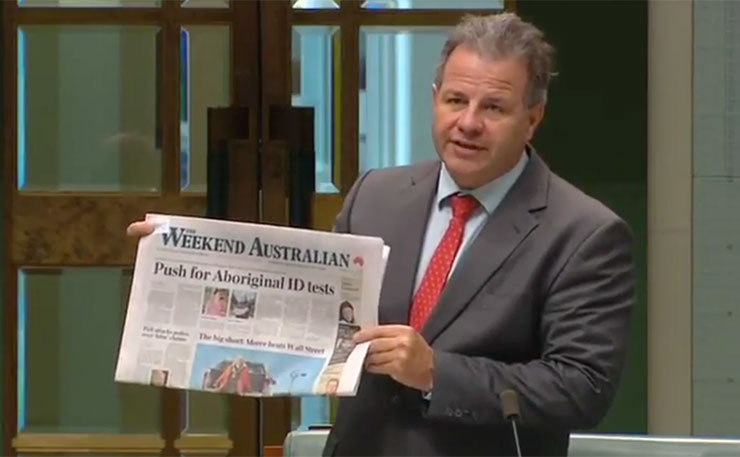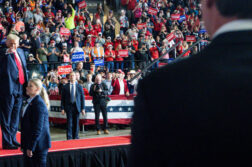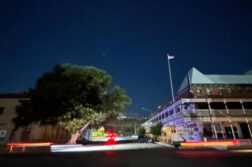ANALYSIS: The only remarkable thing about Dennis Jensen is that he isn’t the leader of the Liberal Party. Chris Graham explains.
Earlier this week in parliament, Dennis Jensen, the Member for Tangney in the outer suburbs of Perth, decided enough was enough.
For those who don’t know him, the South Africa-born Jensen is a climate-change denying, same-sex marriage opposing MP who boycotted Parliament on the day of the National Apology in 2008.
He is, to put not too fine a point on it, a pretty typical member of the Liberal Party.
But on Monday, Jensen decided to briefly depart – and spectacularly so – from the official Liberal Party script.
During a rambling speech about Aboriginal disadvantage – which discussed the colour of African fingernails and whether or not they were pink or blue enough – Jensen made a startling admission.
“There is an argument about historical disadvantage, and that is true. Australia was invaded over 200 years ago,” Jensen told the House of Representatives Chamber.
You could hear a penny drop. But that’s mainly because no-one was in the chamber to listen to him (and it went unnoticed by media as well, until the Guardian’s Catherine Murphy picked it up for this morning’s live blog)
Sadly, that’s the only revelation in Jensen’s speech. The rest is pretty much straight out of the Tony Abbott ‘Prime Minister for Indigenous Affairs’ playbook.
In particular this comment, when Jensen decided to re-animate Abbott’s ‘living in a remote Aboriginal community is a lifestyle choice’ remarks from March 2015.
“I put it to the members of this place that the taxpayers of Australia should not be funding lifestyle choices. Yes, I agree with the former Prime Minister, the member for Warringah, when he refers to Indigenous Australians’ choice to live in remote communities as ‘a lifestyle choice’,” he said.
“In essence, if the ‘noble savage’ lifestyle, a la Jean-Jacques Rousseau, the same one often eulogised, is true, then there is nothing stopping any Indigenous men or women from pursuing such an existence on their own. Just do not expect the taxpayers to subsidise it. My contention is that the ideal of the noble savage may be less sanguine and altogether more Hobbesian: ‘nasty, brutish and short’.”
Jensen even revived memories of Abbott’s ‘nothing but bush’ gaffe: “Economies have been built in remote and isolated places before. Look at Sydney and Melbourne. When Arthur Phillip sailed into Sydney Cove he did not say, ‘There are no jobs, let’s go home.’ But Sydney did not become a thriving city because of bureaucrats or not-for-profits or welfare or governments.”
And believe it or not, Jensen even quoted Martin Luther King, to drive home his point about the problem with ‘discrimination’… which, of course, he is a victim of.
“Martin Luther King dreamed of a time where his four children ‘will one day live in a nation where they will not be judged by the colour of their skin but by the content of their character’. Yet today, in Australia, we have a situation where I, for instance, have been castigated by some as being a racist for having the view that we should be colour blind.”
The speech, an unabashed right-wing rant – did actually have a point. Here’s the nub of what Jensen argued: “In my view, there should be no specific Indigenous policy. There should be no race descriptors. There should be no definition of what it is to be Aboriginal, any more than, say, an Irish-Australian should have a definition and a percentage of Irish blood that he or she should have in order to be described as Irish-Australian.
“I thought I had left behind a situation where certain people, based on race, had a privileged status when it comes to jobs. In South Africa, it was called job reservation. But here we have a situation where certain jobs are reserved for Aboriginals or Torres Strait Islanders. To add insult, many of the advertisements for these jobs say, at the end of the advertisement, that it is a position under the equal employment opportunity act. Really? Talk about Orwellian doublespeak!”

Aboriginal unemployment, of course, is more than double that of non-Aboriginal unemployment, and that doesn’t even factor in the reality that tens of thousands of Aboriginal people aren’t even considered part of the labour force (thus they’re not working, but they’re not considered unemployed).
One of Jensen’s more startling claims was this: “We need to have policy to address issues, not race. Very few policy problems are absolutely unique to Aborigines…”
Except, of course, trachoma is an issue that only affects Aboriginal people (and poor people in some third world nations).
Native title – and the theft of land – is an issue that only affects Aboriginal people.
World record rates of rheumatic heart disease is an issue that only affects Aboriginal people.
World record incarceration rates is also an issue that only affects Aboriginal people. In the Northern Territory, for example, 96 per cent of youth in jail are Aboriginal.
And here’s a stat that will probably reverberate with Jensen – in his new home state of Western Australia, black males are jailed at a rate more than eight times greater than black males were jailed in the dying days of South African Apartheid.
Even so, it’s all about identity: “Self-identification is the key to this puzzle. Indeed, the only reason that this is done is due to the racist laws that we have here in Australia. The road to hell is paved with good intentions. Alternatively, hell is full of good meanings but heaven is full of good works.”
Heaven may be, but the Australian Parliament is increasingly not. Dennis Jensen for PM!
If you’re game, you can read the full transcript of Jensen’s speech here.
Donate To New Matilda
New Matilda is a small, independent media outlet. We survive through reader contributions, and never losing a lawsuit. If you got something from this article, giving something back helps us to continue speaking truth to power. Every little bit counts.





